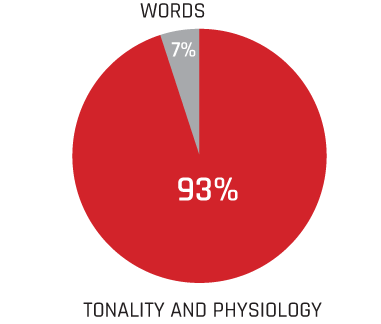Deep Communicating: Speak With Clarity, Emotion, and Impact
Mastering the speaking tone in speech encourages effective delivery, yet many people are unaware of how their vocal tones impact listeners. Misusing tones can undermine the speaker’s message, create confusion, or even cause offense. With our deep communication workshop, you’ll learn to be confident in applying the appropriate voice modulation.
Voiceplace is dedicated to helping speakers understand the importance of vocal tonality and its applications to speaking and listening engagements.
Communicating effectively is vital to success in your business and personal life. People may not focus on what you say, yet they will remember how you make them feel.
At Voiceplace, we change lives by helping people and companies discover and unleash the true power of voice. We’ll train you as a speaker who can influence listeners, move people emotionally, and positively control the outcome of every communication.

By gaining an understanding of how physiology and tonality work together …finding your voice …anyone can become an incredible speaker, presenter, communicator and influencer.
The Importance of Voice
Discover the Real Importance of Voice …
In the workplace, great communication allows people and companies to operate more effectively and be more productive. In our personal lives, finding our “true voice” can increase self-confidence, reduce stress and lead to better relationships and greater professional success.
Studies have shown that the words you speak only count for 7% of whether someone believes, likes, or trusts you. On the other hand, tonality and physiology have a 93% effect. The sounds you make are far more important than the actual content.
In another major study, researchers at Yale University discovered that subjects can read someone’s emotions more accurately by listening to their voice instead of focusing on their facial expressions. This is a critical skill, as studies have shown that those with a higher emotional IQ tend to be higher performers and attain more success than those who don’t.
By understanding how physiology and tonality work together, you can find the perfect sound of your voice and become an incredible speaker, presenter, communicator, and influencer.
Everyone has an Audience
However, not everyone is communicating effectively with that audience. This leads to misunderstanding, frustration and poor performance.
The good news is that whether you are speaking to one person, a small group, or a large crowd, you can do things to become a highly effective communicator. By improving the sound of your voice, you can grab people’s attention and make them listen to your words.



Knowing the importance of public speaking with vocal tonality and modulation directly shapes the perception and reception of one’s message. Vocal tonality refers to how the emotions and meanings behind spoken words are conveyed through the nuances of speech.
Even with well-memorized content, we’ve seen some speakers struggle to captivate audiences, failing to convey their message confidently and appropriately. We aim to help people master voice modulation to engage an audience effectively. This enables speakers to emphasize a message’s key point and maintain interest among listeners throughout their presentation.
You need to find a way to distinguish words and show emotions through your voice. Likewise, you should figure out how people perceive your voice, whether quiet or loud. Our programs will help you practice how to verbalize words out loud that would sound like music to the ears of your listeners.
Types of Tones
Using the wrong tone or poor tonality when speaking can undermine the meaning of your message. Practice speaking skills to use the right tones for your target market and intent. Whether you want an assertive tone or a formal tone, mastering tonality is key to effective speaking and listening.
- A formal tone involves speaking professionally and diplomatically. You can use this in lectures and office environments.
- An informal tone is also a conversational tone of speech. It helps you express your emotions and feelings.
- An informative tone imparts knowledge and describes topics.
- A factual tone states basic facts about a topic rather than describing it.
- An assertive tone is bold and determined. This is perfect for a direct approach to communicating ideas.
- A humorous tone entertains and engages a crowd through amusing words.
- A motivating tone inspires and engages people to accomplish goals.
Techniques to Enhance Voice Modulation and Speaking Tone
Honing vocal tonality and modulation skills can enhance the impact and effectiveness of public speaking engagements. These are some ways to assert power in your voice and make sure listeners get the point of your message:
- Speak slowly and clearly to emphasize your message and give authority.
- Use pauses between points to create suspense and engage the audience.
- Use ascending melodies to clearly make each word and syllable have a different note.
- Elongate or enunciate a word slower to create a dramatic effect.
- Bracket keywords in text to remind you to modulate your voice and emphasize a word.
- Try looping to repeat a sentence in high and low pitch for humor and impact.
- Keep the audience engaged with powerful tonality, like music.
- Modulate volume, speed, and pitch to highlight important points.
- Vary your voice to avoid monotony. Deliver meaning beyond just words.
- Master voice techniques to strengthen public speaking skills and communication.
- Use practical tips like recording yourself to check your pacing and pauses.
What Is the Definition of Tone in Speech?
The tone in speech refers to the vocal inflections and pitch variations a person can use to convey meaning beyond the spoken words alone. It indicates the harmony, music, emotion, and intent behind the words in a sentence.
What Are the Three Types of Tones in Communication?
The three main types of tones in communication are declarative, interrogative, and imperative. A declarative tone conveys information or opinion, an interrogative asks a question, and an imperative gives a command or makes a request.
Why Is Tonality So Important?
Tonality is important because the tone used when talking communicates additional information beyond the literal meaning of the words. For example, tone indicates the speaker’s mood, attitude, and intended meaning. Misunderstandings occur when tone variations and body language don’t match the point of a message.
Develop Your Talking Voice and Tone Today
Would you like to get your message across clearly and confidently every time you speak? My vocal tonality workshop will teach you to skillfully use vocal tones to convey your intent for public speaking. Join me to learn simple techniques to develop a tone that resonates with and motivates your audience.
CONTACT US
Have a question or need information about us or our training? We’d love to hear from you.
Voiceplace, Inc.
Burbank, CA
Contact Scott Alberts
[email protected]
818-848-6225 ext 21


